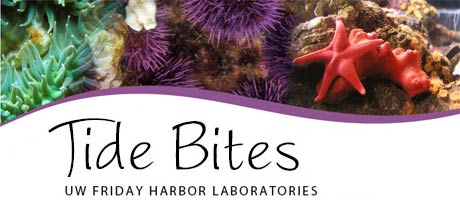Friday Harbor Lab Tide Bites
Posted March 6, 2021 at 4:30 am by Hayley Day
From “Bugs” to Shrimp: the Saga of an Evolving Nervous System
By Jim Truman, Friday Harbor Labs
Things can change a lot in 60 years.
I grew up with a fascination both with invertebrates and water, but living in northeastern Ohio, the invertebrates I knew were insects and the water was the fresh stuff in Lake Erie.
My amateur interests in collecting insects turned to a fascination with their biology while I was an undergraduate at Notre Dame, and solidified into a life-long career with my PhD from Harvard. I thought that insect diversity was rich enough to keep me occupied for a lifetime, yet sixty years later I find myself studying their relatives, the crustaceans.
In the last 60 years, there has also been a change in our understanding of the relationship of the various classes within the Arthropoda, the phylum of animals with an exoskeleton and jointed limbs.
Early on, I had learned that there were three main branches in the arthropod family tree – the Chelicerata (spiders and their kin), the Crustacea, and the Tracheata (arthropods with single-branched limbs including insects, centipedes, and millipedes).
Over the decades, though, a number of lines of evidence including the increasing power of molecular tools upended this view and showed that the insects were not related to the centipedes and millipedes after all, but arose from within the Crustacea.
The combined group is now called the Pancrustacea. This revision of arthropod relationships is similar to our new appreciation of relationships within the vertebrates, as we now know that birds are actually a group of flying dinosaurs! As it turned out, I had actually been working on a specialized type of crustacean throughout my entire career and did not know it! Our research on crustaceans began in earnest in the Spring of 2003 when Lynn Riddiford and I accepted an invitation from Dennis Willows to teach a Research Apprenticeship at FHL. By the end of the quarter, we had bought a house on the island, and were “hooked.”
Read more at http://depts.washington.edu/fhl.
You can support the San Juan Update by doing business with our loyal advertisers, and by making a one-time contribution or a recurring donation.
Categories: Science











No comments yet. Be the first!
By submitting a comment you grant the San Juan Update a perpetual license to reproduce your words and name/web site in attribution. Inappropriate, irrelevant and contentious comments may not be published at an admin's discretion. Your email is used for verification purposes only, it will never be shared.